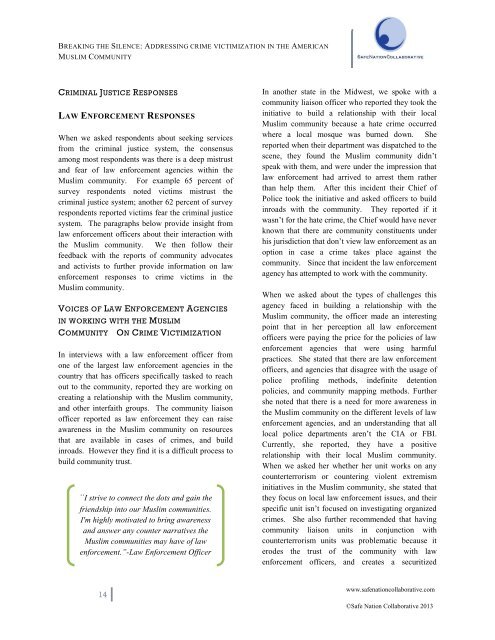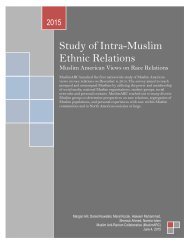Breaking-the-Silence
Breaking-the-Silence
Breaking-the-Silence
You also want an ePaper? Increase the reach of your titles
YUMPU automatically turns print PDFs into web optimized ePapers that Google loves.
BREAKING THE SILENCE: ADDRESSING CRIME VICTIMIZATION IN THE AMERICAN<br />
MUSLIM COMMUNITY<br />
CRIMINAL JUSTICE RESPONSES<br />
LAW ENFORCEMENT RESPONSES<br />
When we asked respondents about seeking services<br />
from <strong>the</strong> criminal justice system, <strong>the</strong> consensus<br />
among most respondents was <strong>the</strong>re is a deep mistrust<br />
and fear of law enforcement agencies within <strong>the</strong><br />
Muslim community. For example 65 percent of<br />
survey respondents noted victims mistrust <strong>the</strong><br />
criminal justice system; ano<strong>the</strong>r 62 percent of survey<br />
respondents reported victims fear <strong>the</strong> criminal justice<br />
system. The paragraphs below provide insight from<br />
law enforcement officers about <strong>the</strong>ir interaction with<br />
<strong>the</strong> Muslim community. We <strong>the</strong>n follow <strong>the</strong>ir<br />
feedback with <strong>the</strong> reports of community advocates<br />
and activists to fur<strong>the</strong>r provide information on law<br />
enforcement responses to crime victims in <strong>the</strong><br />
Muslim community.<br />
VOICES OF LAW ENFORCEMENT AGENCIES<br />
IN WORKING WITH THE MUSLIM<br />
COMMUNITY<br />
ON CRIME VICTIMIZATION<br />
In interviews with a law enforcement officer from<br />
one of <strong>the</strong> largest law enforcement agencies in <strong>the</strong><br />
country that has officers specifically tasked to reach<br />
out to <strong>the</strong> community, reported <strong>the</strong>y are working on<br />
creating a relationship with <strong>the</strong> Muslim community,<br />
and o<strong>the</strong>r interfaith groups. The community liaison<br />
officer reported as law enforcement <strong>the</strong>y can raise<br />
awareness in <strong>the</strong> Muslim community on resources<br />
that are available in cases of crimes, and build<br />
inroads. However <strong>the</strong>y find it is a difficult process to<br />
build community trust.<br />
“I strive to connect <strong>the</strong> dots and gain <strong>the</strong><br />
friendship into our Muslim communities.<br />
I'm highly motivated to bring awareness<br />
and answer any counter narratives <strong>the</strong><br />
Muslim communities may have of law<br />
enforcement.”-Law Enforcement Officer<br />
In ano<strong>the</strong>r state in <strong>the</strong> Midwest, we spoke with a<br />
community liaison officer who reported <strong>the</strong>y took <strong>the</strong><br />
initiative to build a relationship with <strong>the</strong>ir local<br />
Muslim community because a hate crime occurred<br />
where a local mosque was burned down. She<br />
reported when <strong>the</strong>ir department was dispatched to <strong>the</strong><br />
scene, <strong>the</strong>y found <strong>the</strong> Muslim community didn’t<br />
speak with <strong>the</strong>m, and were under <strong>the</strong> impression that<br />
law enforcement had arrived to arrest <strong>the</strong>m ra<strong>the</strong>r<br />
than help <strong>the</strong>m. After this incident <strong>the</strong>ir Chief of<br />
Police took <strong>the</strong> initiative and asked officers to build<br />
inroads with <strong>the</strong> community. They reported if it<br />
wasn’t for <strong>the</strong> hate crime, <strong>the</strong> Chief would have never<br />
known that <strong>the</strong>re are community constituents under<br />
his jurisdiction that don’t view law enforcement as an<br />
option in case a crime takes place against <strong>the</strong><br />
community. Since that incident <strong>the</strong> law enforcement<br />
agency has attempted to work with <strong>the</strong> community.<br />
When we asked about <strong>the</strong> types of challenges this<br />
agency faced in building a relationship with <strong>the</strong><br />
Muslim community, <strong>the</strong> officer made an interesting<br />
point that in her perception all law enforcement<br />
officers were paying <strong>the</strong> price for <strong>the</strong> policies of law<br />
enforcement agencies that were using harmful<br />
practices. She stated that <strong>the</strong>re are law enforcement<br />
officers, and agencies that disagree with <strong>the</strong> usage of<br />
police profiling methods, indefinite detention<br />
policies, and community mapping methods. Fur<strong>the</strong>r<br />
she noted that <strong>the</strong>re is a need for more awareness in<br />
<strong>the</strong> Muslim community on <strong>the</strong> different levels of law<br />
enforcement agencies, and an understanding that all<br />
local police departments aren’t <strong>the</strong> CIA or FBI.<br />
Currently, she reported, <strong>the</strong>y have a positive<br />
relationship with <strong>the</strong>ir local Muslim community.<br />
When we asked her whe<strong>the</strong>r her unit works on any<br />
counterterrorism or countering violent extremism<br />
initiatives in <strong>the</strong> Muslim community, she stated that<br />
<strong>the</strong>y focus on local law enforcement issues, and <strong>the</strong>ir<br />
specific unit isn’t focused on investigating organized<br />
crimes. She also fur<strong>the</strong>r recommended that having<br />
community liaison units in conjunction with<br />
counterterrorism units was problematic because it<br />
erodes <strong>the</strong> trust of <strong>the</strong> community with law<br />
enforcement officers, and creates a securitized<br />
14<br />
www.safenationcollaborative.com<br />
©Safe Nation Collaborative 2013



